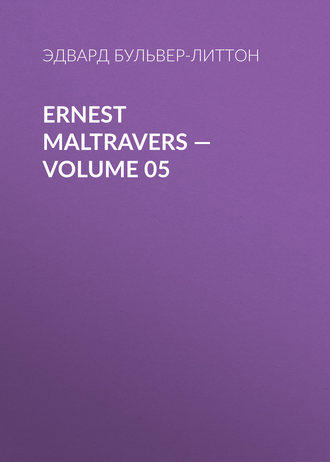
Эдвард Бульвер-Литтон
Ernest Maltravers — Volume 05
"I see that you are not above the weakness of your countryman Congreve," said Cesarini, "who deemed it finer to be a gentleman than an author."
"I always thought that anecdote misconstrued. Congreve had a proper and manly pride, to my judgment, when he expressed a dislike to be visited merely as a raree-show."
"But is it policy to let the world see that an author is like other people? Would he not create a deeper personal interest if he showed that even in person alone he was unlike the herd? He ought to be seen seldom—not to stale his presence—and to resort to the arts that belong to the royalty of intellect as well as the royalty of birth."
"I dare say an author, by a little charlatanism of that nature, might be more talked of—might be more adored in the boarding-schools, and make a better picture in the exhibition. But I think, if his mind be manly, he would lose in self-respect at every quackery of the sort. And my philosophy is, that to respect oneself is worth all the fame in the world."
Cesarini sneered and shrugged his shoulders; it was quite evident that the two authors had no sympathy with each other.
They arrived at last at the chapel, and with some difficulty procured seats.
Presently the service began. The preacher was a man of unquestionable talent and fervid eloquence; but his theatrical arts, his affected dress, his artificial tones and gestures; and, above all, the fanatical mummeries which he introduced into the House of God, disgusted Maltravers, while they charmed, entranced, and awed Cesarini. The one saw a mountebank and impostor—the other recognised a profound artist and an inspired prophet.
But while the discourse was drawing towards a close, while the preacher was in one of his most eloquent bursts—the ohs! and ahs! of which were the grand prelude to the pathetic peroration—the dim outline of a female form, in the distance, riveted the eyes and absorbed the thoughts of Maltravers. The chapel was darkened, though it was broad daylight; and the face of the person that attracted Ernest's attention was concealed by her head-dress and veil. But that bend of the neck, so simply graceful, so humbly modest, recalled to his heart but one image. Every one has, perhaps, observed that there is a physiognomy (if the bull may be pardoned) of /form/ as well as face, which it rarely happens that two persons possess in common. And this, with most, is peculiarly marked in the turn of the head, the outline of the shoulders, and the ineffable something that characterises the postures of each individual in repose. The more intently he gazed, the more firmly Ernest was persuaded that he saw before him the long-lost, the never-to-be-forgotten mistress of his boyish days, and his first love. On one side of the lady in question sat an elderly gentleman, whose eyes were fixed upon the preacher; on the other, a beautiful little girl, with long fair ringlets, and that cast of features which, from its exquisite delicacy and expressive mildness, painters and poets call the "angelic." These persons appeared to belong to the same party. Maltravers literally trembled, so great were his impatience and agitation. Yet still, the dress of the supposed likeness of Alice, the appearance of her companions, were so evidently above the ordinary rank, that Ernest scarcely ventured to yield to the suggestions of his own heart. Was it possible that the daughter of Luke Darvil, thrown upon the wide world, could have risen so far beyond her circumstances and station? At length the moment came when he might resolve his doubts—the discourse was concluded—the extemporaneous prayer was at an end—the congregation broke up, and Maltravers pushed his way, as well as he could, through the dense and serried crowd. But every moment some vexatious obstruction, in the shape of a fat gentleman or three close-wedged ladies, intercepted his progress. He lost sight of the party in question amidst the profusion of tall bonnets and waving plumes. He arrived at last, breathless and pale as death (so great was the struggle within him), at the door of the chapel. He arrived in time to see a plain carriage with servants in grey undress liveries, driving from the porch—and caught a glimpse, within the vehicle, of the golden ringlets of a child. He darted forward, he threw himself almost before the horses. The coachman drew in, and with an angry exclamation, very much like an oath, whipped his horses aside and went off. But that momentary pause sufficed.—"It is she—it is! O Heaven, it is Alice!" murmured Maltravers. The whole place reeled before his eyes, and he clung, overpowered and unconscious, to a neighbouring lamp-post for support. But he recovered himself with an agonising effort, as the thought struck upon this heart that he was about to lose sight of her again for ever. And he rushed forward, like one frantic, in pursuit of the carriage. But there was a vast crowd of other carriages, besides stream upon stream of foot-passengers,—for the great and the gay resorted to that place of worship, as a fashionable excitement in a dull day. And after a weary and a dangerous chase, in which he had been nearly run over three times, Maltravers halted at last, exhausted and in despair. Every succeeding Sunday, for months, he went to the same chapel, but in vain; in vain, too, he resorted to every public haunt of dissipation and amusement. Alice Darvil he beheld no more!
CHAPTER XIII
"Tell me, sir,
Have you cast up your state, rated your land,
And find it able to endure the charge?"
/The Noble Gentleman/.
By degrees, as Maltravers sobered down from the first shock of that unexpected meeting, and from the prolonged disappointment that followed it, he became sensible of a strange kind of happiness or contentment. Alice was not in poverty, she was not eating the unhallowed bread of vice, or earning the bitter wages of laborious penury. He saw her in reputable, nay, opulent circumstances. A dark nightmare, that had often, amidst the pleasures of youth, or the triumphs of literature, weighed upon his breast, was removed. He breathed more freely—he could sleep in peace. His conscience could no longer say to him, "She who slept upon thy bosom is a wanderer upon the face of the earth—exposed to every temptation, perishing perhaps for want." That single sight of Alice had been like the apparition of the injured Dead conjured up at Heraclea—whose sight could pacify the aggressor and exorcise the spectres of remorse. He was reconciled with himself, and walked on to the Future with a bolder step and a statelier crest. Was she married to that staid and sober-looking personage whom he had beheld with her? was that child the offspring of their union? He almost hoped so—it was better to lose than to destroy her. Poor Alice! could she have dreamed, when she sat at his feet gazing up into his eyes, that a time would come when Maltravers would thank Heaven for the belief that she was happy with another?
Ernest Maltravers now felt a new man: the relief of conscience operated on the efforts of his genius. A more buoyant and elastic spirit entered into them—they seemed to breathe as with a second youth.
Meanwhile, Cesarini threw himself into the fashionable world, and to his own surprise was /feted/ and caressed. In fact, Castruccio was exactly the sort of person to be made a lion of. The letters of introduction that he had brought from Paris were addressed to those great personages in England between whom and personages equally great in France politics makes a bridge of connection. Cesarini appeared to them as an accomplished young man, brother-in-law to a distinguished member of the French Chamber. Maltravers, on the other hand, introduced him to the literary dilettanti, who admire all authors that are not rivals. The singular costume of Cesarini, which would have revolted persons in an Englishman, enchanted them in an Italian. He looked, they said, like a poet. Ladies like to have verses written to them, and Cesarini, who talked very little, made up for it by scribbling eternally. The young man's head soon grew filled with comparisons between himself in London and Petrarch at Avignon. As he had always thought that fame was in the gift of lords and ladies, and had no idea of the multitude, he fancied himself already famous. And, since one of his strongest feelings was his jealousy of Maltravers, he was delighted at being told he was a much more interesting creature than that haughty personage, who wore his neckcloth like other people, and had not even those indispensable attributes of genius—black curls and a sneer. Fine society, which, as Madame de Stael well says, depraves the frivolous mind and braces the strong one, completed the ruin of all that was manly in Cesarini's intellect. He soon learned to limit his desire of effect or distinction to gilded saloons; and his vanity contented itself upon the scraps and morsels from which the lion heart of true ambition turns in disdain. But this was not all. Cesarini was envious of the greater affluence of Maltravers. His own fortune was in a small capital of eight or nine thousand pounds: but, thrown in the midst of the wealthiest society in Europe, he could not bear to sacrifice a single claim upon its esteem. He began to talk of the satiety of wealth, and young ladies listened to him with remarkable interest when he did so—he obtained the reputation of riches—he was too vain not to be charmed with it. He endeavoured to maintain the claim by adopting the extravagant excesses of the day. He bought horses—he gave away jewels—he made love to a marchioness of forty-two, who was very kind to him and very fond of /ecarte/—he gambled—he was in the high road to destruction.







